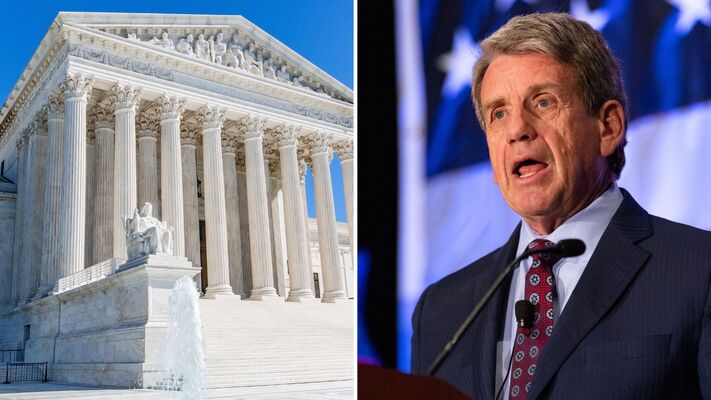One of the administrative state’s most important powers is on the chopping block today thanks to several fishermen from New Jersey and Rhode Island, and federal agencies are, understandably, unnerved.
The History
On June 25, 1984, the Supreme Court of the United States — at the time, the "Burger Court" — ruled, in the words of Justice John Paul Stevens, that if a federal “statute is silent or ambiguous with respect to [a specific issue], the question for the court is whether the agency’s answer is based on a permissible construction of the statute.” This precedent, which conservatives have crusaded against for years, is broadly known as the Chevron doctrine or deference.
Born out of the landmark case Chevron U.S.A., Inc. v. Natural Resources Defense Council, Inc., the Chevron doctrine, in simple terms, determined that in the case that Congress did not explicitly address a particular issue, or perhaps left a hole in one of its policies, federal regulators — not the courts or Congress itself — could fill in the gap, empowering the so-called fourth branch of the U.S. government, the administrative branch. Per this deference to regulators, the courts could, primarily, intervene only if an agency’s interpretation was “manifestly contrary” to the blatant “construction of the statute.”
“Chevron is, at bottom, about the power of administrative agencies relative to the courts,” explained administrative expert Jody Freeman. “It stands for the idea that judges should defer to agency interpretations of the gaps and ambiguities in the laws they implement, so long as those interpretations are reasonable. Under this doctrine, agencies get some room to maneuver when Congress does not specifically anticipate or resolve every imaginable legal question (as is often the case), on the theory that Congress entrusted the statutes in the first instance to the agencies, and because they are more expert and experienced in their domains than courts.”
New Challenges
For nearly 30 years, this long-standing precedent has been a “foundational framework in administrative law,” despite questions about its constitutionality, frustrating “business groups hostile to government regulation.” But today, the principle is under threat at the Supreme Court — and conservatives are celebrating.
“We have already given agencies way too much power, and giving them this deference steals mostly from the power of Congress and somewhat from the power of the courts,” opined constitutional attorney and Convention of States co-founder Michael Farris. “Chevron deference destroys checks and balances and makes a mockery of the idea we are a Republic.”
According to Supreme Court reporter Adam Liptak, the nation’s highest court is set to hear two cases today pushing back against the Chevron doctrine, with the possibility to overturn or weaken the precedent, sending the administrative state into “convulsive shock.”
“The cases the justices will consider were brought on behalf of two sets of fishermen, one in New Jersey and the other in Rhode Island,” Liptak described. “They objected to a maritime agency’s interpretation of a 1976 law that requires them to carry observers to gather data to prevent overfishing,” which costs the fishermen roughly $700 per day.
“I can see why this case is such a political thing,” said Bill Bright, one of the plaintiffs. “But to me, it’s not political. This is my livelihood.”
Below, we lay out Michael Farris’s thoughts on why Chevron deference has been harmful to the American system of governance and how the Supreme Court now faces a crucial opportunity to correct course.
What Makes Us a Republic — And Why Chevron Undermines It
“Some people think that the most important provision in the Constitution is the First Amendment,” maintained Farris. “Others would say the Second Amendment. Those are very, very important, of course.
But the Founders had a different idea. One of the reasons I say this with confidence is that both of these essential liberties are found in amendments that came four years after the Constitution was written.
I would suggest that the Founders located their most important provision right where you couldn’t miss it. Article I Section 1. This is where you find the provision that makes us a Republic: All legislative authority is vested in the Congress.
This means that the President can’t make law. The bureaucracy can’t make law. The courts can’t make law. And, for heaven’s sake, the U.N. can’t make law.
In a Republic, only elected legislators can make law.
The Supreme Court has two cases today that could move our country in an important direction toward being a Republic and in favor of the rule of law.
The key issue in the cases goes by the name ‘Chevron deference.’
What this means is that when there is an ambiguity in a law passed by Congress the courts should give deference to meaning created by the bureaucratic agency that is charged with its enforcement.
You can already see what’s wrong with this deference. The meaning that should be followed is its original meaning—that is, the meaning of Congress. They made the law, not the agency.
An Article V convention can truly fix this whole problem and return us to being a Republic. But a good decision on these cases would be a welcome move in the right direction.”
To join Michael Farris and millions of other Americans in support of the Founder’s Article V solution, sign the Convention of States petition below and get involved today.
;coalition_id:;anedot_url:}|#


